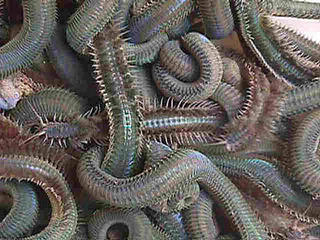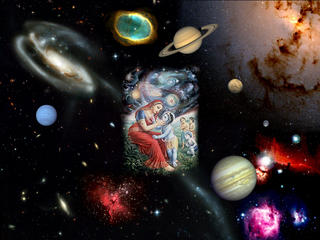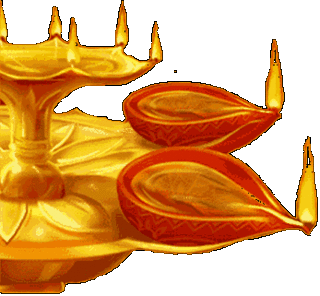
The Vedic scriptures divide consciousness into five categories, namely covered, shrunken, budding, blooming and fully bloomed.

Trees and plants, for example, are almost inert. They fall into the “covered consciousness” category. They seem to show no sign of consciousness, but when we observe them carefully, we see they have a limited consciousness.

Other living entities, such as worms, insects, and other animals are in “shrunken consciousness”. They are not as covered as the plants, but their consciousness is not fully developed either.

Human beings have “budding consciousness”. A bud appears shrunken, but it has the potential to bloom into flower. Human consciousness has similar potential; it appears shrunken like the animals, but humans have the innate ability to develop their consciousness to an almost unlimited extent, up to the point of knowing the Absolute Truth, the Supreme Personality of Godhead.
Other species do not have this special ability. That’s why the Vedic scriptures consider the human form of life is most elevated. Indeed, all scriptures consider human life especially sacred.

When a human being begins to inquire sincerely about the Absolute truth, his budlike spiritual consciousness begins to expand or evolve. That is the “blooming” state of consciousness.

When as a result of his inquiry he practices regulated spiritual discipline, he evolves further and further. Finally, he attains complete God realisation, the “fully bloomed” state of consciousness.

God realisation is possible because the real identity of a living being is the spirit soul, not the material body. The soul is not a product of material nature; it comes from the spiritual nature. When the soul falls into the lower levels of consciousness, it becomes covered by matter first by a subtle, or ethereal, material body made of mind, intelligence and false ego, then by a gross material body made of earth, water, fire, air and ether (The Pancha-Budhas).
The bodies we perceive with our material vision are gross material bodies. Within the gross body is the subtle body, which we cannot see with our eyes but can perceive by our intelligence.
Finer than this subtle body of mind, intelligence and false ego is the nonmaterial soul, which animates the body. The soul is the source of consciousness, the source of life in the body. The soul is the “I”. As long as the soul is in the body, the body appears alive, consciousness flows through the body, and the covered soul misidentifies the body as the self.

An embodied soul transmigrates from one body to another as a result of his previous activities. His every action leaves an imprint on the mind, or the subtle body, and accordingly the subtle body takes its shape.
For example, if one acts like an angel, his subtle body becomes like that of an angel. If one acts like a pig, his subtle body becomes like that of a pig. When the soul leaves the gross body at death, the subtle body carried the soul to an appropriate womb determined by the shape of the subtle body, in this way the soul transmigrates from one body to another according to the state of consciousness it has developed.

The Vedic scriptures describe that one gets a human body after transmigrating though eight million lower species. Gradually each fallen soul evolves through the various stages of consciousness as mentioned before. At the budding stage the embodied soul has the chance to develop fully his spiritual consciousness by awakening his relationship with God, the supremely conscious being. If he neglects that opportunity, he may again undergo transmigration through the covered, shrunken and budding stages.

The subhuman species are engrossed in bodily consciousness. Often human beings are also, but human beings can raise themselves to higher levels. That is the main difference between man and the animal. If a man in spite of his higher faculties simply pursues the animal propensities of eating, sleeping, mating, and defending, he grossly misuses a wonderful gift. He misses a rare opportunity.
A human being, because of his elevated intelligence, has the freedom to choose, either to evolve spiritually and get out of material consciousness altogether or to go down to go down to a lover level of consciousness again.
Less intelligent persons often consider sensual enjoyment the goal of life and squander their lives struggling for objects pleasing to their senses. Their absorption in material ambitions makes lower consciousness their choice by default.
Intelligent persons realise the futility of such endeavours for bodily pleasures. They realise that everything in the material realm is thinkers were averse to material enjoyments. But mere aversion is not enough. One may be averse to material enjoyments and renounce that world, but the desire for enjoyment is natural.

Because the soul is a minute spark like part of the supreme enjoyer, Krishna, the soul has his qualities in minute degree; therefore the innate tendency for seeking enjoyment is inseparable from the soul. To understand the soul is to understand that we cannot altogether suppress or eliminate desire for enjoyment.
A truly intelligent person, therefore, tries to find the standard of real enjoyment. If such a person is serious and has good fortune, he comes in touch with a genuine spiritual teacher, by whose mercy he gets to know what real enjoyment is. With the spiritual master’s guidance he gets the opportunity to re-establish his long-lost relationship with God. This awakening of the soul’s dormant love of God is an absolute necessity because the soul, as a spark like part of God, is never fully satisfied unless united with Him. This is the central message of the Vedic texts.
The Vedic scriptures advise us that even if we want to enjoy material things, instead of making independent attempts for fulling our desires, we should render devotional service and pray to Lord for the fulfilment of our desires. This is not the purest standard of loving devotion, but atleast it acknowledges the Lord for the supreme proprietor. Naturally, as one grows in his awareness, one realises the need to offer everything to its true proprietor, the making of such offerings is the beginning of devotional service to the Lord.

The word devotion implies an intense, trance like love. We experience that love by offering God objects we consider valuable or beautiful. We know how intense is the love between a young man and woman, but how often does our love for the Lord reach that high intensity?

Still, the love between a man and a woman is nothing but when we run after it, it runs away from us. That’s why, to a greater or lesser degree, everyone is frustrated sooner or later with material life; we do not get our heart’s desire. The reason for this frustration is that we are spiritual, not material.
Our craving for enjoyment is also spiritual, but having forgotten about our spiritual nature, we search in vain for enjoyment within the material world. We identify with the material body and try to enjoy matter, but we can’t. Naturally we become frustrated. If you take a fish out of water and offer its all comforts on land, will it ever be happy? In same way, we are of the spiritual nature. We can never be made truly happy by material enjoyments.

If one wants to taste factual pleasure, he must develop spiritual consciousness, which culminates in love of God. That’s why every religion teaches us to pray, to call out the name of the Lord in all earnestness, so that we can become conscious of His divine form. All scriptures recommend the chanting of the Lord’s holy name. The spirituality sound penetrates the covering of matter and enables the spiritual self to see the Absolute Truth face to face. That is the topmost state of consciousness in full bloom. It is the ultimate evolution of man, not only for today but for all time.

0 Comments:
Post a Comment
<< Home